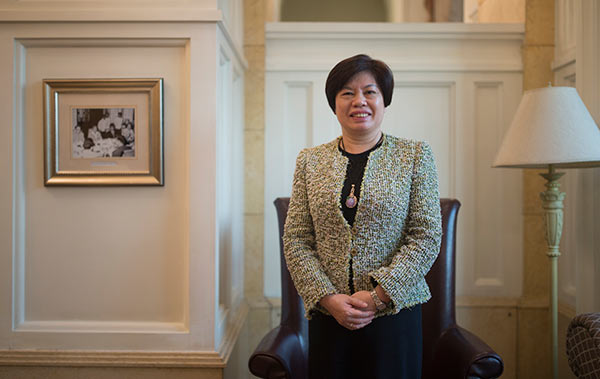 |
|
Pauline Ngan Po-ling. |
Headwear manufacturer outlines balancing act of moving up the value chain.
The success story of a headwear manufacturer's foray into Bangladesh underscores the vast potential of Beijing's Belt and Road Initiative.
National People's Congress (NPC) deputy Pauline Ngan Po-ling, also vice-chairperson of Mainland Headwear, takes pride in her baseball cap manufacturing business. "I think my company was the only one to register a significant profit surge last year," she said.
A circular issued by Hong Kong-listed company Mainland Headwear last December identified the production line in Dhaka, Bangladesh, as its source of good fortune.
It was not the only Hong Kong-based garment maker to depend on Bangladesh to stay buoyant. Textile giant Yangtzekiang Garment reported a 10-percent revenue plunge for the six months ending last September; its only factory that did well is also in Bangladesh.
Ngan's Bangladesh production line is fully booked until 2017. But at home, her garment counterparts are fading fast.
"They used to put up hiring notices. Now notices to lease out their premises are all over the place," Ngan said of her industrial neighborhood in Shenzhen.
The labor costs are forcing much of the garment industry out of China. Bangladesh, though immature for delicate manufacturing, is a paradise for labor-intensive tasks. The cost of hiring a worker in Shenzhen could buy eight times the labor productivity in Bangladesh, she said.
The Shenzhen factory hires 1,600 workers for product development and smaller orders. Ngan said it was the lone survivor among the "big five" Hong Kong headwear makers in Guangdong province.
The national lawmaker addressed the woes of Chinese industry on March 6, when Zhang Dejiang, NPC Standing Committee chairman, attended panel discussions of the Hong Kong and Macao delegations. She hoped the central government could help industries move out of low-value tasks, and support others to move up the value ladder.
The infrastructure boom derived from the Belt and Road Initiative, Ngan added, would benefit Chinese industries which set up new bases in South Asia.
Growing goodwill
Ngan goes to great lengths to show care for the Bangladeshi employees. Her workers receive regular overtime pay. She has educated Chinese supervisors not to treat workers rudely. Eggs are offered to workers to take home. "People regularly faint at work due to low blood sugar, a result of malnutrition," she said.
Life expectancy in Bangladesh, at about 71 years, is ranked 111th among 194 countries, according to the World Health Organization. She hopes her factory can at least help people in nearby villages to live better.
Ngan believes her workers are satisfied. Union strikes, known as "hartals", are notoriously violent in Bangladesh. Her facility has not seen a strike for two years. She recalled vividly how her local partner became concerned and agitated when she insisted on speaking directly to a protest rally through a loudspeaker. "I told them to talk to me directly about everything," she said.
Ngan still travels to Dhaka once every two weeks. She advises the Hong Kong government to sponsor students to see Bangladesh and other places by themselves. This is because exposure and knowledge are vital to seizing opportunities. Ngan believes they are also key to the long-term health of Chinese secondary industry.
